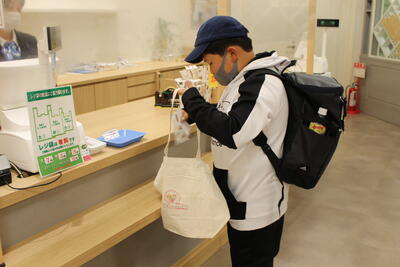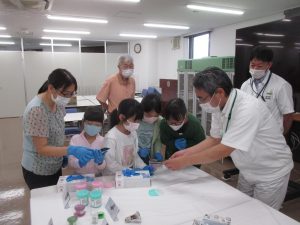Home » Posts tagged 'Sustainability'
Tag Archives: Sustainability
Tochigi Prefecture’s “Eco-Tabi Challenge”
Teaching Elementary School Students How to Become More Sustainable and Responsible Consumers

As mentioned in my previous blog post, East Asia is known as a region with high plastic consumption, yet high rankings on the management of their waste (Majidi, 2023). Recycling and waste management is one of several crucial aspects of responsible consumption, which is one of the United Nations Sustainable Development Goals (Department of Economic and Social Affairs). Out of the nations within East Asia, Japan is one of the highest-ranking countries in recent years for its educational programs on sustainable consumption (Majidi, 2023). Due to my position at Moka City Hall in the Tochigi Prefecture of Japan, I am doing research on a daily basis through local databases and newsletters. Upon further research of Tochigi Prefecture’s specific educational programs for primary school students, I came across a recent program called the Eco-Tabi Challenge. The Eco-Tabi Challenge was a sustainability initiative managed by the Resource Recycling Promotion Section of the Tochigi prefectural government where schools were challenged to have a zero waste school field trip (Tochigi Prefecture, 2021). A total of 78 schools applied and 48 completed the required documents for the program (Tochigi Prefecture, 2022).
For the Eco-Tabi Challenge, the regional government of Tochigi recruited elementary schools both inside and outside of the prefecture to host a school trip in Tochigi sometime between June 15, 2021, to March 31, 2022. During this trip, schools would need to implement initiatives such as ensuring that all students bring reusable water bottles, toothbrushes & toothpaste, and bags. Schools also had to make sure that all food was eaten and that there were no leftovers. It was up to schools to choose how to incorporate these initiatives and create unique initiatives of their own that aligned with the goal of the initiative to teach students how to practice environmentally friendly efforts. Five schools were recognized by the local government for their exceptional educational activities and initiatives that they included as part of their programs. I will provide a quick translated summary of these schools’ accomplishments as recognized by the prefectural government. As I am not a professional translator, I will note that there could be possible errors when translating this information into English. You can find the original Japanese sources cited at the end of this post.
Sakuyama Elementary School had a school trip with 15 students which followed the initial guideline of the Eco-Challenge (Tochigi Prefecture, 2023). In addition to the challenge’s requirements, Sakuyama Elementary School utilized digital technology to create presentations of their school trip and highlight their sustainability efforts during the trip by bringing their own slippers. 24 students from Ishizuka Elementary School researched souvenirs and restaurants prior to their school trip, in order to reduce overconsumption, and shared their findings through Google Docs for their classmates and families to review (Tochigi Prefecture, 2023). Although Kokufu Minami Elementary School only had 9 students participate, they came up with interesting inclusion like creating a newsletter to share with their school and utilizing a challenge card during their school trip to encourage students to engage in sustainable behaviors like using a reusable bag (Tochigi Prefecture, 2023). Arakawa Elementary School had 54 students record their sustainability initiatives on challenge sheets and receive a score based on the number of items each student completed (Tochigi Prefecture, 2023). 20 students from Ouchi Central Elementary School also utilized making PowerPoint presentations reflecting on their school trip and also had everyone use a reusable bag while buying souvenirs and walking around (とちテレNEWS).
Researcher Madeline Hoensheid cites a study that showed how an elementary school recycling education program had a significant impact on students’ behavior, habits, and attitudes toward recycling outside of school (Hoensheid, 2021). Researchers such as Eleni Altikolatsi emphasize the importance of recycling and sustainability education as early as possible to increase the likelihood of creating more environmentally aware citizens (Altikolatsi et al., 2021). These findings are still relatively new and there are few studies that have been conducted to analyze the behavioral impact of sustainability education for elementary school students. However, initial findings prove to be promising and researchers, as well as policymakers, should work to include more standardized sustainability learning in education, with a focus on responsible consumption and production.
Sources:
Altikolatsi, E., Karasmanaki, E., Parissi, A., & Tsantopoulos, G. (2021). Exploring the Factors Affecting the Recycling Behavior of Primary School Students. World, 2(3), Article 3. https://doi.org/10.3390/world2030021
Department of Economic and Social Affairs. (n.d.). Goal 12 | Ensure sustainable consumption and production patterns. United Nations. Retrieved March 5, 2023, from https://sdgs.un.org/goals/goal12
Hoensheid, M. (2021). Long-Term Effects When Educating Elementary Students on Waste Reduction in Minnesota. School of Education and Leadership Student Capstone Projects. https://digitalcommons.hamline.edu/hse_cp/703
Majidi, H. (2023). Will Recycling Today’s Consumerism Lead to Tomorrow’s Solutions? Education & Development. https://sites.miis.edu/educationanddevelopment/2023/03/13/will-recycling-todays-consumerism-lead-to-tomorrows-solutions/
とちテレNEWS (Director). (2021, November 20). エコたび栃木 環境にやさしい修学旅行 エコバッグで買い物. https://www.youtube.com/watch?v=rL6uyhp_6II
Tochigi Prefecture. (2021). エコたび栃木プロジェクトの開始について. 栃木県. https://www.pref.tochigi.lg.jp/d05/2021ecotabitochigi.html
Tochigi Prefecture. (2022). エコたび栃木プロジェクト参加校募集!. 栃木県. https://www.pref.tochigi.lg.jp/d05/ecotabi.html
Tochigi Prefecture. (2023). 令和4年度エコたび栃木プロジェクト「エコたびチャレンジ」優秀校の決定について. 栃木県. https://www.pref.tochigi.lg.jp/d05/houdou/ecotabi-yusyu2023.html真岡市立大内中央小学校. (2021). エコ旅とちぎ. http://www.moka-tcg.ed.jp/ouchjsc/blogs/blog_entries/view/34/6781b3febd5f3297b9a6aec7faf1144f?frame_id=74
Will Recycling Today’s Consumerism Lead to Tomorrow’s Solutions?

Role of Education on the Path to Sustainable Consumption and Production in East Asia
Throughout the past century, our global society has adapted over time into a major producer and consumer of plastics. According to the OECD Global Plastics Outlook, global plastic production was at 2 million tonnes in 1950 and grew to 420.05 million tonnes in 2017 (Geyer et al., 2017). When it comes to the disposal of these plastics, the majority of it is discarded or put in a landfill (Geyer et al., 2017). Most of the world’s plastic waste is single-use plastics from the packing and textile sectors (Geyer et al., 2017). This data highlights the rapid consumerism behavior currently adopted by many of the world’s population. Media on social media has highlighted the impact of major contributors to our current climate crisis such as fast fashion, mismanaged plastic waste disposal, and microplastics emitted into the world’s water supply. There is an ongoing debate regarding the importance of addressing multinational corporations’ plastic waste behaviors compared to individual consumers’ behavior which has been discussed in various capacities. However, in the case of plastic consumption, I believe that there is significant importance in addressing consumers’ behaviors and beliefs. By having more responsible individuals that put more value on sustainable consumerism, it could have the potential to change the response of policymakers and corporations responsible for plastic production.
Learning more responsible plastic consumption lifestyle choices in an educational setting could hold the potential of changing the behaviors and attitudes of future generations toward sustainability. Target 12.8.1 of the United Nations Sustainable Development Goal 12 for Ensuring Sustainable Consumption and Production Patterns outlines the need for more nations to implement national education policies that mainstream sustainable environmental development education into curricula, teacher’s education, and student assessments (United Nations, 2018).
Learning responsible plastic consumption from a very early age in primary school allows time for students to become very familiar with the subject matter and build upon this knowledge over time as they have more on-hands learning experiences in their lives outside of school. Researchers Monte and Reis suggest a pedagogical model of how to incorporate concepts like sustainable plastic consumption (including the “3Rs” reduce, reuse, recycle) and environmental citizenship for primary school (Monte and Reis, 2021). One of the primary learning outcomes of their model is the hope that students will feel empowered to utilize the knowledge they are provided and engage in active participation in environmental citizenship including activism, volunteering, and environmental public policy support. These types of learning skills would be useful outside of educational spaces and provide practical knowledge that can be used daily when transforming our society’s relationship to the global climate. In Monte and Reis’s research, they cite several studies which have concluded that “this methodology is highly effective in younger children, because it is at this stage that their behaviors are malleable and moldable” (Monte and Reis, 2021).
Asia is a vast region with the largest population in the world. China is the country with the most significant number of inhabitants and is located in East Asia. Other countries in East Asia include Japan, South Korea, North Korea, Taiwan, and Mongolia, as well as Hong Kong and Macau. The per capita of mismanaged plastic waste in China ranks much lower compared to nations like the Philippines and Brazil (Meijer et al., 2021). However, due to its sheer population size, China produces the second-largest amount of mismanaged plastic waste at approximately 12.27 million tonnes per year (Meijer et al., 2021). Nearby Japan is the second largest per capita plastic packaging waste-producing country globally where people on average buy 183 PET bottles per year (Heinrich-Böll-Stiftung, 2022). I have experienced and seen this first-hand during my time living in Japan and seeing what feels like vending machines on almost every street corner, even in more isolated places like to mountains of Tochigi Prefecture. South Korea and Taiwan also have reports of very high per capita rates of single-use plastic consumption. However, when looking at the Plastic Management Index (PMI), Japan ranks second overall (Back to Blue Initiative, 2019). Some suggest that some of Japan’s cultural norms, such as mandatory school cleaning at all school levels and strict trash sorting local policies, play a role in the way individuals learn and understand sustainable consumption (Sekine, 2020). Tetra Pak, a major international food processing and packaging company has also facilitated educational programs and research in Japan like the Bellmark Programme where students learned about recycling milk cartons which are an essential part of Japanese school lunches (Tetra Pak, 2018). Reflecting on my connection to the city of Moka in Japan, the city works with local industrial factories to arrange educational tours for primary school students to learn about the use of recycled materials when making new products (Moka City Hall, 2021). Because of these factors, East Asia poses a unique opportunity to further analyze the role of education in plastic waste management and learning responsible consumerism.
Sources:
Back to Blue Initiative. (2019). Plastics Management Index [Back to Blue Initiative]. Back to Blue – An Initiative of Economist Impact and The Nippon Foundation. Retrieved February 25, 2023, from https://backtoblueinitiative.com/plastics-management-index/
Geyer, R., Jambeck, J. R., & Law, K. L. (2017). Production, use, and fate of all plastics ever made. Science Advances, 3(7), e1700782. https://doi.org/10.1126/sciadv.1700782
Heinrich-Böll-Stiftung. (n.d.). Plastic Atlas Japan Special Edition (6 pages in English) | Heinrich Böll Stiftung Hong Kong | Asia Global Dialogue. Heinrich-Böll-Stiftung. Retrieved February 25, 2023, from https://hk.boell.org/en/2022/05/27/plastic-atlas-japan-en
Meijer, L. J. J., van Emmerik, T., van der Ent, R., Schmidt, C., & Lebreton, L. (2021). More than 1000 rivers account for 80% of global riverine plastic emissions into the ocean. Science Advances, 7(18), eaaz5803. https://doi.org/10.1126/sciadv.aaz5803
Monte, T., & Reis, P. (2021). Design of a Pedagogical Model of Education for Environmental Citizenship in Primary Education. Sustainability, 13(11), 6000. https://doi.org/10.3390/su13116000
Sekine, M. (2020). Student led recycling at Keimei Gakuen. Round Square. https://www.roundsquare.org/educational-insights/student-led-recycling-at-keimei-gakuen/
Tetra Pak. (2018). Schools make recycling fun in Japan. Bellmark Programme in Japan. https://www.tetrapak.com/insights/cases-articles/schools-recycling-japan
United Nations. (2018). Goal 12 | Department of Economic and Social Affairs. https://sdgs.un.org/goals/goal12
総合政策部 秘書広報課 広報広聴係, & Moka City Hall. (2021). 夏休み 工場見学・環境学習会 [真岡市役所]. https://www.city.moka.lg.jp/toppage/soshiki/hisyokouhou/1/kouhoukocho/mokawatching/mokawatchingreiwa3/12752.html

